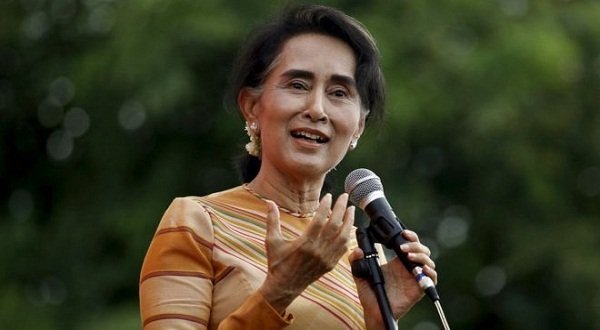
The United States Holocaust Museum has rescinded its prestigious Elie Wiesel Award which was given to Suu Kyi in 2012 and urged her to cooperate with international efforts to establish the truth about the atrocities committed in Rakhine state.
WASHINGTON (AA) — The United States Holocaust Museum has rescinded a human rights award from Myanmar’s state counsellor and de facto leader Aung San Suu Kyi for failing to speak out against her country’s persecution of Rohingya Muslims.
The museum, whose mission is “to confront hatred, prevent genocide and promote human dignity”, said in a letter published Wednesday on its website that it is rescinding its prestigious Elie Wiesel Award which was given to Suu Kyi in 2012 for her resistance to military dictatorship and advocacy for freedom and human rights in Myanmar.
“As the military’s attacks against the Rohingya unfolded in 2016 and 2017, we had hoped that you — as someone we and many others have celebrated for your commitment to human dignity and universal human rights — would have done something to condemn and stop the military’s brutal campaign and to express solidarity with the targeted Rohingya population,” it said in the letter.
“The National League for Democracy, under your leadership, has instead refused to cooperate with United Nations investigators, promulgated hateful rhetoric against the Rohingya community and denied access to and cracked down on journalists trying to uncover the scope of the crimes in Rakhine state.”
The museum also urged Suu Kyi to use her unique standing and official role as State Counsellor and Foreign Minister to cooperate with international efforts to establish the truth about the atrocities committed in Rakhine state and secure accountability for perpetrators.
In November last year, the Oxford City Council in England removed an honorary award presented to Suu Kyi.
In the same month, Irish musician and Live Aid founder Bob Geldof returned his Freedom of the City of Dublin award in protest against the civic honor also going to Myanmar’s state counsellor
The Rohingya, described by the UN as the world’s most persecuted people, have faced heightened fears of attack since dozens were killed in communal violence in 2012.
Since Aug. 25, 2017, more than 750,000 refugees, mostly children and women, have fled Myanmar and crossed into Bangladesh after Myanmar forces launched a crackdown on the minority Muslim community, according to Amnesty International.
The refugees are fleeing a military operation in which security forces and Buddhist mobs have killed men, women and children, looted homes, and torched Rohingya villages.
At least 9,000 Rohingya were killed in Rakhine state from Aug. 25 to Sept. 24 last year, according to Doctors Without Borders.
In a report published last Dec. 12, the doctors’ group said the deaths of 71.7 percent or 6,700 Rohingya were caused by violence. They include 730 children below the age of five.
The UN documented mass gang rapes, killings — including of infants and young children — brutal beatings, and disappearances committed by security personnel. In a report, UN investigators said such violations may have constituted crimes against humanity.

